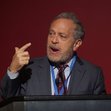#4. Bust Up Wall Street
When Americans think of how the...
#4. Bust Up Wall Street
When Americans think of how the economic rules are
stacked against them, they naturally think of Wall Street.
When the Wall Street bubble burst in 2008 because of
excessive risk-taking, millions of working Americans lost their jobs, health
insurance, savings, and homes.
But The Street is back to many of its old tricks. And
its lobbyists are busily rolling back the Dodd-Frank
Act, intended to prevent another crash.
The biggest Wall Street banks are also much larger. In
1990, the five biggest banks had 10 percent of all of the nation’s banking
assets. Now, they have 44 percent – more than they had at the time of the 2008 crash.
They have a virtual lock on taking
companies public, play key roles pricing commodities, are involved in all major
U.S. mergers and acquisitions and many overseas, and responsible for most of
the trading in derivatives and other complex financial instruments.
And
as they’ve gained dominance over the financial sector, they’ve
become more politically potent. They’re major sources of campaign funds for
both Republicans and Democrats.
Wall Street banks supply personnel for key
economic posts in Republican and Democratic administrations, and lucrative
employment to economic officials when they leave Washington.
It’s a vicious cycle. The bigger they get, the more likely
it is that government will bail them out if they get into trouble again. This,
in turn, confers on them an ever-larger competitive advantage over smaller,
community-minded banks that don’t have the implied guarantee – which gives the biggest banks
even more economic and political power.
What should be done?
First, resurrect the Glass-Steagall Act that used to
separate investment from commercial banking.
Second, put a small sales tax on every financial
transaction. This would discourage speculation and slow down the casino. Not
incidentally, such a tax could generate billions of dollars a year for, say,
better schools.
But the most important thing we should do is bust up the
big banks. Any bank that’s too big to fail is too big, period.
Antitrust law should be used the way it was against
the big oil trusts and the telephone monopoly. The idea was to prevent too much
economic and political power from concentrating in too few hands. And that’s
precisely the problem with Wall Street.
The only sure way to stop excessive risk-taking on Wall
Street so you don’t risk losing your job or your savings or your home, is to put
an end to the excessive economic and political power of Wall Street.
It’s time to bust up the big banks.
Robert B. Reich's Blog
- Robert B. Reich's profile
- 1244 followers



